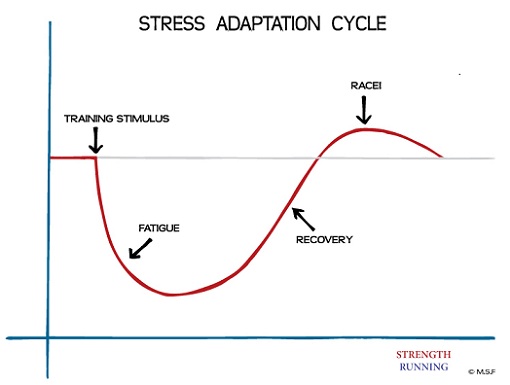When I first started running, the abilities of better runners simply stunned me. Their physical prowess was impressive, but their mental fitness was profound.

As an eager 14-year old on my high school’s cross country team, I barely ever ran with the upperclassmen.
They were fast. They were strong. And the way they thought about running was profoundly different than how I thought about it.
Their idea of what was difficult represented an elevated perception of difficulty:
- A 10-mile run? No big deal!
- An ability to surf a wave of suffering during workouts that I couldn’t imagine
- Their willingness to run nearly every day, consistently over time, and love it
Since my first day at cross country practice nearly 22 years ago, I’ve become more and more convinced that our mind is the next key to unlocking enormous gains in performance.
If you agree, join us.
Because the way we think about running is arguably just as important as the training that we do:
- Do you avoid fast workouts because you think you’ll get hurt?
- Has your weekly mileage not progressed for years?
- Does your training always “revert to your baseline” whenever you’re not training for a race?
- Do you find yourself always reevaluating your goals because you never reach them?
These are common mistakes that stem from mindset traps – or poor mental models about our running.
When we subscribe to certain ideas that limit us, we’ll never achieve our loftiest running ambitions. And since 2020 is the Year of Mastering Our Mindset, I refuse to let that happen to you.
In this article, you’re going to learn the common mindset traps that I see runners making so you can avoid them.
Poor Goal Setting
Goals are incredible things to have. They’re your “North Star,” giving your training meaning and direction.
Without them, you wouldn’t know how to structure your training, how to progress and move forward, and when to periodize your running.
But we do make consistent mistakes with goal creation. The two most common are:
Rushing the Completion of a Goal
Successful goals have many characteristics but one of the most important is its timeframe.
In other words, when are you going to accomplish this goal? Next week, in 3 months, or two years from now?
This is where many runners fall into the trap of condensing the time needed to accomplish their goal. Often, the goal itself is possible but the timeframe is unrealistic.
For example, awhile back a runner emailed me and said:
“I started running a few weeks ago and I’m up to 9 miles per week with a 4 mile long run. I’m also working on increasing the run portion (I’m walking every few minutes) of all my runs.
I signed up for the Marine Corps Marathon this fall and am interested in a custom training plan to help me finish strong. My biggest goal is to finish the marathon without any injuries. It’s in 22 weeks – do you think you can help?”
It’s extraordinarily difficult for a beginner runner can go from 9 miles per week with a 4 mile long run to the successful completion of a 26.2 mile race in 22 weeks.
Rushing goal completion invites injury, heartbreak, and a higher rate of failure.
Patience isn’t sexy, but it’s mandatory in running.
No Tiers of Goals
What happens if Plan A fails? You switch to Plan B!
High-level coaches and sports psychologists encourage their athletes to set tiers of goals. Because having only one goal often sets you up for disappointment.
That’s because “success” is not a binary phenomenon. It’s a spectrum.
If you prefer a school analogy, you might not have scored a perfect 100 on the test, but a 95 is still an A! Despite not reaching the ultimate goal, this person is still wildly successful.
That’s because a failure is not always a failure. It’s often a lesser success that should still be celebrated.
For example, if your goal is a sub-4 marathon with a PR of 4:10, you might have these goals:
- Tier 1: Sub-4
- Tier 2: Sub-4:05
- Tier 3: Any PR
- Tier 4: Finish healthy
Always think in tiers and levels of success. It’s a spectrum, not a binary outcome.
Mental Toughness Detraining
Most of us are familiar with what happens when we stop running: we lose fitness.
This process is called “detraining” and it’s part of the stress-adaptation cycle:

But a fitness decline isn’t the only thing that happens when you stop running (or start training substantially less). Your mental toughness also starts to decrease, too!
Just like you can become physically detrained when you stop running, you can also become mentally detrained.
That’s because mental toughness is a learned skill that becomes easier to use the more you practice. Mental toughness demands regular exposure to stress, adversity, and obstacles.
Without stress, you’ll never flex your mental toughness muscle. And it will atrophy.
After all, if mental toughness is reacting positively to adversity, and you never experience adversity, how can you expect to become mentally tough?
Instead, it’s critical to regularly expose yourself to stress with mental toughness training:
- Regular long runs
- Consistent workouts
- Progressive mileage
- Regular racing
These aspects of training are the most difficult parts of running. While it’d be easy to run at a relaxed effort for low mileage, that won’t improve your mental toughness.
We need the difficult workouts and races to build this valuable mental skill.
“Trying Harder”
Too often, we rely on luck or chance to improve.
And this weakness often surrounds racing:
- Feeling debilitating pre-race anxiety
- Losing focus and downgrading the goal mid-race (i.e., “settling” for a subpar performance)
- Fear of pushing too hard
So what do we do? Most of the time, our reaction is to “try harder” next time. We say things like:
“I’m not going to give up with a mile to go like I did last time.”
“Now that I’m hurt, THIS TIME I’m actually going to stick with my rehab.”
“Even though I usually run out of motivation after a few weeks, I’ll stay consistent for this race.”
But these aren’t goals. They’re wishes.
Without a plan, we’re putting our faith in the chance that we stay consistent. Or the chance that we don’t give up.
Alas, relying on willpower is a fool’s errand. Willpower won’t make you a better runner. It’s fleeting and unreliable.
Instead, we must develop strategies for the very problems that we plan on experiencing. We must plan ahead, recognizing that adversity is part of running and that willpower will never be a reliable source of motivation.
This strategy impacts how you set goals, how you think about workouts, and how effective you are at racing.
If you always tell yourself that you’ll “try harder,” that “next time will be different,” and if you know what to do (but you just don’t follow through), then you’ll love our focus on mastering our mindset this year.
And we’re just getting started.
Coming Soon: Mindset Mastery
2020 is the Year of Mastering Your Mindset. Our goal is to develop the tools, systems, and strategies from sports psychology to help you build:
- FOCUS on the immediate, short-term, and long-term
- INTENSITY at the right level, no matter what effort you need
- ANXIETY MANAGEMENT skills to prevent debilitating stress
- MENTAL TOUGHNESS to never give up, no matter how hard running gets
- CONFIDENCE in your abilities and to always chase your biggest goals
This may be our most ambitious project yet because changing your mind is difficult. It takes time, dedication, and a willingness to work.
There are often starts and stops, setbacks, and false progress (much like life itself!).
But the benefits are clear. The next big improvements in running will come from mastering our mindset, developing optimal thinking patterns, and developing the mental skills to mitigate adversity.
Those “mental skills” give you a lot of benefits:
- Improved confidence and self-image
- Better emotional management during times of high stress, like right before a tough workout or major race
- Improved focus while racing and training
- The ability to set more realistic and appropriately challenging goals
- More productive self-talk (the “story” you tell yourself about yourself in your head)
- Increased motivation to complete your training
With a better understanding of performance psychology – and the ability to apply it – you’ll be able to cope with many different types of stressors and still excel.
And now, we’re taking things to the next level.
I’m sharing even more coaching guidance on building these skills in our newest email series:
- How to Master Your Mindset (ecourse)
And finally, I’ve released our newest program on building your mental fitness. My goal is to get you results like Adam:
I used to struggle with focus during long runs. The way you built the confidence in me is remarkable. Now a long run to me is just another run and I tackle it with confidence.
You taught me that it’s OK to have a failed run and just pick up where I left the next week. The results have been surprising. I feel like a different runner. A long run is no longer the beast that it used to be. I just go about it normally.
Don’t miss anything – sign up here to get started!